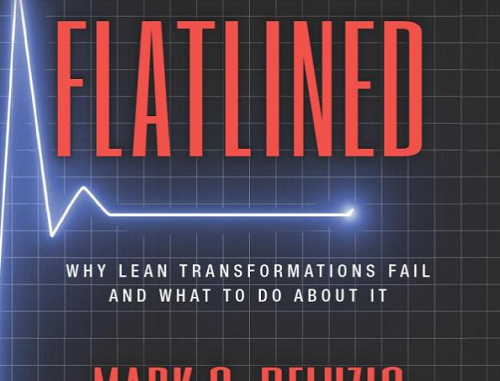
Flatlined: Why Lean Transformations Fail and What Do About It is Mark DeLuzio’s study of Lean philosophy and why corporations still struggle to implement and sustain it in the modern business world. A brief explanation of the philosophy seems necessary. The Lean philosophy, put simply and perhaps crudely, stresses efficiency while maintaining an elite level of excellence, reducing waste, and eliminating redundancy. DeLuzio knows the subject well. He is one of the driving forces behind the formation of the \Danaher Business System (DBS). Drawing on Lean principles, the DBS builds off four cornerstone priorities – innovation, delivery, cost, and quality. DeLuzio, in his roles as public speaker and author, has spread DBS and Lean principles throughout both the business and educational world.
ABOUT THE AUTHOR: markdeluzio.com/
His focus never wavers throughout Flatlined. The book’s eight chapters present his arguments in systematic and well-reasoned fashion avoiding any unnecessary dross and zeroing in on the issues at hand. There are many. DeLuzio often centers his criticisms of how businesses and corporations adopt Lean principles on the idea that many corporate officers who opt for implementing a Lean design on their business structure possess a fundamental misunderstanding of its purposes and potential. His language is exact. There is no sense, however, of DeLuzio playing the role of a disapproving schoolteacher scolding his CEO students for their ignorance. Instead, the tone of the book is confident and DeLuzio writes as someone sincerely interested in enlightening professionals about how a full understanding Lean principles and how to put them to use can unleash the latent power of any business or organization.
In regards to his language once again, DeLuzio is never self-indulgent and writes with the steady hand of an experienced author. He makes his case in clear and compelling fashion. This is a subject that, in lesser hands, might succumb to obfuscation or difficult reading, but DeLuzio deserves fulsome praise for taking a possibly unwieldy subject and making it comprehensible for any experienced adult reader. A small assortment of accompanying illustrations over the course of the text further helps illuminate DeLuzio’s ideas, but the bedrock strength of Flatlined remains his prose.
AMAZON: www.amazon.com/Flatlined-Lean-Transformations-Fail-About/dp/036724778X
The book is short. This is impressive, in and of itself, because of the arguably exhaustive treatment DeLuzio accords his subject over this short span. There is no sense of the book shortchanging the reader or the author glossing over key points in the interest of brevity alone. DeLuzio intends this book possess an ongoing usefulness for its target audience rather than being “one and done” so it is crucial for the information to have a level of completeness measuring up to such an ambition. He often strikes a personal note, as well, throughout the book – the sense of gratitude he exhibits towards his contemporaries and mentors has genuine affection and the humanity present in these passages adds an extra dimension to the work. Mark DeLuzio’s Flatlined: Why Lean Transformations Fail and What Do About It is prescriptive, but it is never high-handed. It is one of the more rewarding business-focused nonfiction efforts in many years and should remain relevant for years to come.
Clay Burton
